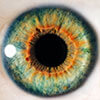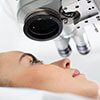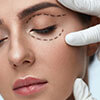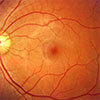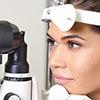Vision Correction
Modern Cataract Surgery
Advanced technology, improved surgical technique, and more educated patients have significantly increased patient expectations for cataract surgery outcomes. When medically appropriate, our surgeons may offer femtosecond laser technology for cataract surgery, at no additional cost to patients. The femtosecond laser provides consistent incisions and outcomes, reduces healing time, and gives our surgeons an exceptional tool to help patients achieve their best vision. Many patients not only desire improved vision after cataract surgery, but they would like to be less dependent on glasses. Our Vision Correction program is designed to help set appropriate expectations for visual outcomes after cataract surgery.
The Cataract Consult
Traditionally, a surgeon provides a thorough explanation for every cataract patient, describing many different lens options and explaining how each lens works. This often confuses the patient and makes the decision of “What to do?” difficult. Vision Correction simplifies this discussion and focuses on the patient’s desired vision outcome, making the conversation much easier for the patient to understand.
The fundamental questions patients must answer are:
- “Do I want only what my insurance covers, and will I accept wearing glasses after surgery?” If patients want only what is covered by their insurance, then the expectation is understood that they may require glasses to see clearly for all activities and distances.
- “Do I want to decrease my need for glasses after surgery?” If patients want to decrease their need for glasses then Vision Correction is a suitable choice.
The two options for Vision Correction address these questions.
Vision Correction 1 (VC1)
This option is for patients who desire good, uncorrected vision at one focal point: Distance or Near. These patients will likely have either an aspheric monofocal IOL or toric IOL implanted.
Vision Correction 2 (VC2)
This option is for patients who desire good, uncorrected vision for two focal points: Distance and Near. These patients will likely have an accommodative or multifocal lens implanted.
While cataract surgery is an insurance-covered benefit, Vision Correction is not considered “medically necessary,” and therefore, is not covered by insurance. Patients choosing Vision Correction will need to pay additional out-of-pocket costs.
Vision Correction is an all-inclusive package that comprises enhanced diagnostics before and during surgery, the newest premium lens implants, and any corrective procedure required post-operatively to achieve the patient’s desired outcome. This may include a lens exchange/rotation, corneal relaxing incisions for astigmatism, or additional laser vision correction enhancement. The recommendation for enhancement is based on the surgeon’s discretion and the patient’s individual needs.



